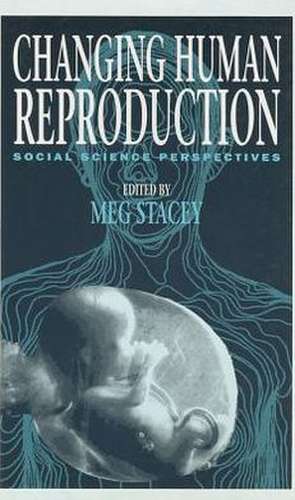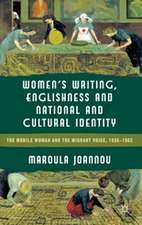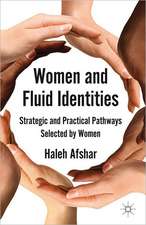Changing Human Reproduction: Social Science Perspectives
Editat de Meg Staceyen Limba Engleză Paperback – 20 sep 1992
Preț: 480.68 lei
Nou
Puncte Express: 721
Preț estimativ în valută:
91.98€ • 96.03$ • 76.12£
91.98€ • 96.03$ • 76.12£
Carte tipărită la comandă
Livrare economică 04-18 aprilie
Preluare comenzi: 021 569.72.76
Specificații
ISBN-13: 9780803986541
ISBN-10: 0803986548
Pagini: 192
Dimensiuni: 138 x 216 x 15 mm
Greutate: 0.25 kg
Ediția:1
Editura: SAGE Publications
Colecția Sage Publications Ltd
Locul publicării:London, United Kingdom
ISBN-10: 0803986548
Pagini: 192
Dimensiuni: 138 x 216 x 15 mm
Greutate: 0.25 kg
Ediția:1
Editura: SAGE Publications
Colecția Sage Publications Ltd
Locul publicării:London, United Kingdom
Recenzii
`Important because it demonstrates plainly the importance of social science perspectives in artificial reproduction, and shows how they may influence ethcial as well as practical considerations. What is so often ignored nowadays is that birth is as much a social event as a biological one, so that biological interventions have social consequences' - Bulletin of Medical Ethics
`A welcome addition to the now considerable literature on the new reproductive technologies' - New Generation
`The chapters, by acknowledged authorities in their fields, in this excellent book are taken from papers given at the 1990 British Assocition for the Advancement of Science annual conference. The introduction, by Meg Stacey, sets out the need for investigations which expand critical awareness. It also sets out the two broad themes, taken largely from anthropology, of what is natural, and kinship and relatedness, which both implicitly and explicitly are the threads which link the six chapters of the book together. She discusses the way in which social science research has been neglected in the `scientific revolution in human reproduction', the teaming of `real science with obstetrics', and the ways in which it could help form a better understanding of the social and cultural values which will emanate from the new reproductive technologies... The overriding issue in this book is that the medical and scientific new reproductive technologies must begin to address the cultural and social implications of their work' - Sociology
`A welcome addition to the now considerable literature on the new reproductive technologies' - New Generation
`The chapters, by acknowledged authorities in their fields, in this excellent book are taken from papers given at the 1990 British Assocition for the Advancement of Science annual conference. The introduction, by Meg Stacey, sets out the need for investigations which expand critical awareness. It also sets out the two broad themes, taken largely from anthropology, of what is natural, and kinship and relatedness, which both implicitly and explicitly are the threads which link the six chapters of the book together. She discusses the way in which social science research has been neglected in the `scientific revolution in human reproduction', the teaming of `real science with obstetrics', and the ways in which it could help form a better understanding of the social and cultural values which will emanate from the new reproductive technologies... The overriding issue in this book is that the medical and scientific new reproductive technologies must begin to address the cultural and social implications of their work' - Sociology
Cuprins
Introduction - Meg Stacey et al
What is the Social Science Perspective?
Social Dimensions of Assisted Reproduction - Meg Stacey
From Private Patients to Privatization - Naomi Pfeffer
Making Sense of Missed Conceptions - Sarah Franklin
Anthropological Perspectives on Unexplained Infertility
Having Triplets, Quads or Quins - Frances Price
Who Bears the Responsibility?
Gamete Donation and the Social Management of Genetic Origins - Erica Haimes
The Meaning of Assisted Kinship - Marilyn Strathern
Conclusion - Meg Stacey et al
What is the Social Science Perspective?
Social Dimensions of Assisted Reproduction - Meg Stacey
From Private Patients to Privatization - Naomi Pfeffer
Making Sense of Missed Conceptions - Sarah Franklin
Anthropological Perspectives on Unexplained Infertility
Having Triplets, Quads or Quins - Frances Price
Who Bears the Responsibility?
Gamete Donation and the Social Management of Genetic Origins - Erica Haimes
The Meaning of Assisted Kinship - Marilyn Strathern
Conclusion - Meg Stacey et al
Descriere
Despite the extensive debates about new reproductive technologies, there is still little published research on the social and cultural implications of the new reproductive techniques. Our understanding of how babies are conceived and what it means to be a parent or relative have become more complex.
The authors argue that the neglect of social research into new reproductive technologies has led to a failure to make the necessary provisions for their consequences. The plight of the involuntary childless who, having been helped to conceive, find themselves with three, four or more babies illustrates this point clearly.














